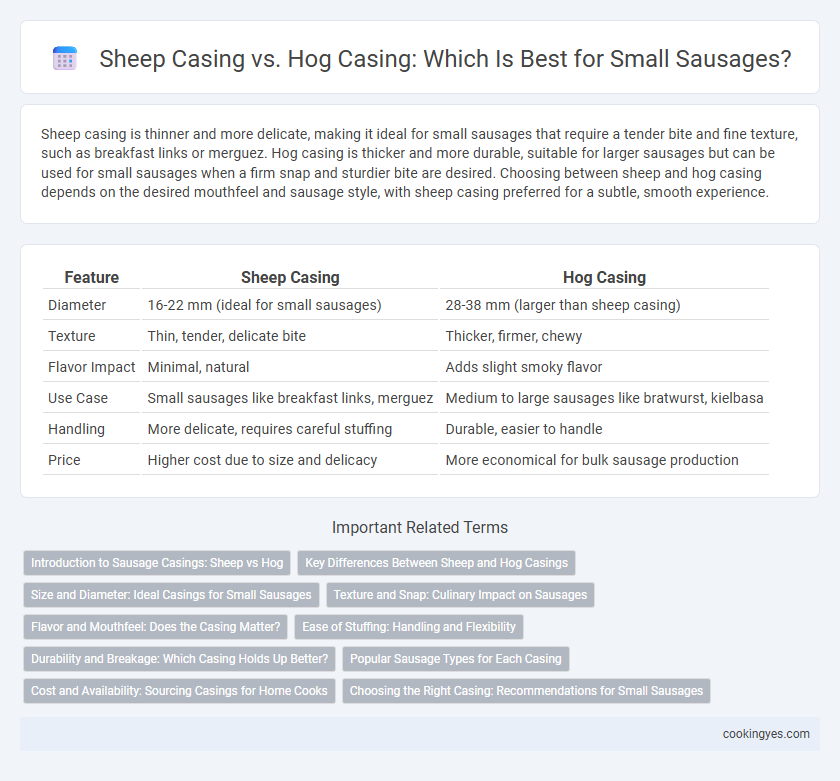Sheep casing is thinner and more delicate, making it ideal for small sausages that require a tender bite and fine texture, such as breakfast links or merguez. Hog casing is thicker and more durable, suitable for larger sausages but can be used for small sausages when a firm snap and sturdier bite are desired. Choosing between sheep and hog casing depends on the desired mouthfeel and sausage style, with sheep casing preferred for a subtle, smooth experience.
Table of Comparison
| Feature | Sheep Casing | Hog Casing |
|---|---|---|
| Diameter | 16-22 mm (ideal for small sausages) | 28-38 mm (larger than sheep casing) |
| Texture | Thin, tender, delicate bite | Thicker, firmer, chewy |
| Flavor Impact | Minimal, natural | Adds slight smoky flavor |
| Use Case | Small sausages like breakfast links, merguez | Medium to large sausages like bratwurst, kielbasa |
| Handling | More delicate, requires careful stuffing | Durable, easier to handle |
| Price | Higher cost due to size and delicacy | More economical for bulk sausage production |
Introduction to Sausage Casings: Sheep vs Hog
Sheep casings, typically measuring 18-22 mm in diameter, provide a tender and thin option ideal for small sausages like breakfast links and snack-sized varieties, enhancing quick cooking and delicate texture. Hog casings, larger at 28-32 mm, offer robust strength and a traditional snap, making them suitable for medium-sized sausages such as bratwurst or Italian sausages that require a chewier bite. Both natural casings influence flavor absorption and moisture retention but differ significantly in size and texture to accommodate varying sausage styles and cooking methods.
Key Differences Between Sheep and Hog Casings
Sheep casings are thinner and more delicate, making them ideal for small sausages like breakfast links and cocktail wieners, while hog casings are thicker and sturdier, suited for larger sausages such as bratwursts and Italian sausages. Sheep casings offer a finer texture and more natural snap during cooking, enhancing the eating experience for small sausages. Hog casings provide greater durability and chewiness, enabling sausages to withstand longer cooking times and grill heat without bursting.
Size and Diameter: Ideal Casings for Small Sausages
Sheep casings, with a diameter typically ranging from 16 to 28 millimeters, are ideal for small sausages such as breakfast links and snack-sized varieties, offering a tender bite and consistent size. Hog casings are larger, usually measuring between 28 to 36 millimeters, making them less suitable for small sausages but better for medium to large sausage products. The precise sizing of sheep casings ensures uniform cooking and presentation, which is crucial for small sausage products demanding delicate texture and portion control.
Texture and Snap: Culinary Impact on Sausages
Sheep casing offers a thin, delicate texture that enhances small sausages with a natural, satisfying snap ideal for artisanal sausages requiring a refined bite. Hog casing, being thicker and sturdier, provides a robust snap and chewier texture, making it suitable for heartier sausages where durability and a pronounced bite are desired. The choice between sheep and hog casing significantly influences the sausage's mouthfeel and overall culinary experience, defining the eating quality and presentation.
Flavor and Mouthfeel: Does the Casing Matter?
Sheep casings provide a thinner, more delicate bite that enhances the natural flavor of small sausages, creating a tender mouthfeel preferred in gourmet products. Hog casings offer a thicker, chewier texture that imparts a robust snap, adding a satisfying contrast to the savory filling. Flavor absorption is subtle in both, but the casing thickness directly influences the eating experience, making casing choice crucial for desired sausage texture and taste.
Ease of Stuffing: Handling and Flexibility
Sheep casing offers superior ease of stuffing due to its natural thinness and flexibility, making it ideal for small sausages requiring delicate handling. Hog casing, while sturdy and thicker, presents more resistance during stuffing, which can complicate the process for smaller calibers. The pliability of sheep casing reduces tearing and ensures smoother stuffing, enhancing efficiency during sausage production.
Durability and Breakage: Which Casing Holds Up Better?
Sheep casings generally offer thinner walls, making them ideal for small sausages but more prone to breakage during stuffing and cooking. Hog casings are thicker and tougher, providing superior durability and resistance to bursting, especially for sausages that require more handling or longer cooking times. For small sausages that prioritize a delicate bite, sheep casings are preferred, but hog casings hold up better under stress and reduce casing rupture.
Popular Sausage Types for Each Casing
Sheep casings are commonly used for small sausages such as breakfast links, breakfast sausages, and breakfast bratwurst due to their natural thinness and delicate texture, which enhances the eating experience without overpowering flavor. Hog casings, thicker and more robust, are preferred for larger or more substantial sausages like traditional bratwurst, Italian sausages, and brat links, providing durability and a satisfying snap. Popular sausage types for sheep casing include merguez and chipolata, while hog casings are often chosen for kielbasa and smoked sausage varieties.
Cost and Availability: Sourcing Casings for Home Cooks
Sheep casings are generally more expensive and less readily available than hog casings, making them a costlier option for home cooks producing small sausages. Hog casings are easier to source from butcher shops and online suppliers, providing greater accessibility and affordability for small-batch sausage making. Pricing for hog casings typically ranges lower due to higher supply and demand, helping home cooks manage budget constraints effectively.
Choosing the Right Casing: Recommendations for Small Sausages
Sheep casings, known for their thin and delicate texture, are ideal for small sausages such as breakfast links and snack sticks, providing a tender bite and easy snapping experience. Hog casings, thicker and more robust, suit larger sausages but may overpower the intended size and texture of small sausages, making them less suitable for delicate recipes. For optimal results, select sheep casings for small sausages to ensure proper casing shrinkage, flavor absorption, and authentic presentation.
Sheep casing vs hog casing for small sausages Infographic

 cookingyes.com
cookingyes.com